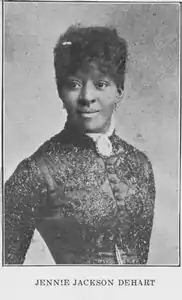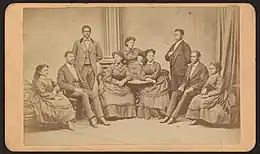Jennie Jackson
Jennie Jackson (1852 – May 4, 1910) was an American singer and voice teacher. She was one of the original members of the Fisk Jubilee Singers, an African-American a cappella ensemble. She toured with the group from 1871 to 1877. In 1891 she formed her own sextet, the Jennie Jackson Concert Company.
Jennie Jackson | |
|---|---|
 Jennie Jackson DeHart, from a 1911 publication. | |
| Born | 1852 |
| Died | May 4, 1910 (aged 57–58) Cincinnati, Ohio |
| Nationality | United States |
| Other names | Jennie Jackson DeHart (after marriage) |
| Occupation | singer |
| Known for | original member of the Fisk Jubilee Singers |

Early life
Jennie Jackson was born in Kingston, Tennessee.[1] Her grandfather was enslaved in the household of Andrew Jackson. Her parents were also enslaved, but she was raised in freedom from an early age, after her mother, a laundress, was freed.[2] They lived in Nashville, Tennessee, during, and after the American Civil War. Jackson enrolled at Fisk Free Colored School as one of its first students after it opened in 1866.[1] She joined the Jubilee Singers when they formed in 1871.[3]
Career
Jackson toured with the Fisk Jubilee Singers from 1871 to 1877, including concerts in Great Britain and Europe. They sang spirituals and other music in a cappella arrangements.[4] Their tours raised funds for the Fisk University campus.[5] Their audiences included Henry Ward Beecher, William Lloyd Garrison, Queen Victoria, Mark Twain, and Ulysses S. Grant.[6][7][8] She left the group in 1877 when she fell ill with colitis.[9][10] She was at the center of a large 1873 painting of the Fisk Jubilee Singers, by Edmund Havel, commissioned by Queen Victoria to commemorate their performance for her.[11][12][13]
Jackson later sang with a reorganized version of the group and with fellow Fisk Jubilee Singer Maggie Porter Cole's group. In 1891 she formed her own sextet, the Jennie Jackson Concert Company.[14] She also taught voice.[15]
Personal life
Jackson married Rev. Andrew J. DeHart in 1884, and lived in the Walnut Hills neighborhood of Cincinnati, Ohio.[3][16] She was widowed in 1909, and she died at home in 1910, aged 58 years, in Cincinnati.[17] In 1978, Jackson and the other original members of the Fisk Jubilee Singers were granted posthumous honorary Doctor of Music degrees from Fisk University.[18]
References
- Gustavus D. Pike, Jubilee Singers and their Campaign for Twenty Thousand Dollars (Hodder and Stoughton 1873): 61.
- Booker T. Washington, The Story of the Negro: The Rise of the Race from Slavery, Volume 2 (Doubleday, Page & Company 1909): 269.
- A. E. W., "Looking Backward" in Monroe Alphus Majors, Noted Negro Women: Their Triumphs and Activities (Donohue and Henneberry 1893): 134–138.
- Sandra Jean Graham, "How African-American Spirituals Moved from Cotton Fields to Concert Halls" Zocalo Public Square (October 29, 2018).
- "Singers Rescued School with Voices" The Daily Oklahoman (December 15, 1995): 171. via Newspapers.com
- Mary E. Nalle, "The Preservation of the American Negro Folk Song" Social Service Review (August 1916): 13, p. lxxii.
- Gabriel Mllner, "The Tenor of Belonging: The Fisk Jubilee Singers and the Popular Culture of Postbellum Citizenship" Journal of the Gilded Age and Progressive Era 15(4)(2016): 399.
- "Tennessee's Jubilee Singers Sang to Save Fisk University" Wilson Daily Times (October 27, 1995): 11A. via Newspaperarchive.com
- Sandra Graham, "On the Road to Freedom: The Contracts of the Fisk Jubilee Singers" American Music 24(1)(Spring 2006): 1–29.
- Katie J. Graber, "'A Strange, Weird Effect': The Fisk Jubilee Singers in the United States and England" American Music Research Center Journal (2013): 27–52.
- Edmund Havel, "Fisk Jubilee Singers, 1873" Fisk University Library, Special Collections.
- J. B. T. Marsh, The Story of the Jubilee Singers: With Their Songs (Houghton Mifflin 1881): 116.
- "The Beginning of Jubilee Singing" The Lyceum Magazine (April 1920): 1819.
- Lynn Abbott, Doug Seroff, Out of Sight: The Rise of African American Popular Music, 1889-1895 (University Press of Mississippi 2002): 89, 190. ISBN 9781604730395
- Delilah Leontium Beasley, The Negro Trail Blazers of California (Times Mirror 1919): 214.
- Ella Sheppard Moore, "The Original Jubilee Singers" The American Missionary (June 1902): 358.
- "Gleanings from All Parts" Chicago Defender (June 4, 1910): 3. via ProQuest
- Saundra Ivey, "Fisk Grads Told Blacks Must Still Battle High Unemployment" The Tennessean (May 16, 1978): 5. via Newspapers.com
External links
- An illustration depicting Jennie Jackson, published in 1873, from the Schomburg Center for Research in Black Culture, Jean Blackwell Hutson Research and Reference Division, New York Public Library Digital Collections.
- Edmund Havel, "Jubilee Singers at the Court of Queen Victoria" (1873), Special Collections, Fisk University Library.
- Toni Passmore Anderson, "The Fisk Jubilee Singers: Performing ambassadors for the survival of an American treasure, 1871-1878" (PhD dissertation, Georgia State University 1997).